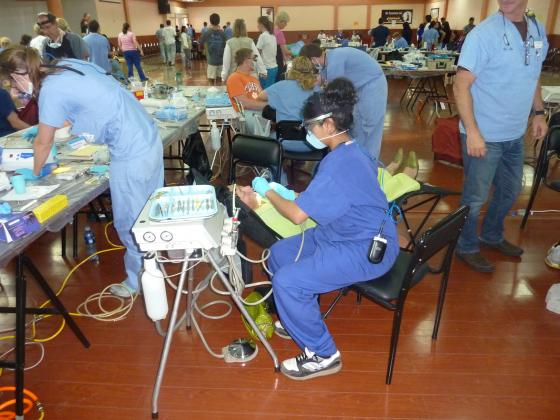
Francine Fletcher and Surinder Poonian write about their experiences working at the Dental Community Fellowship Mission as dentist volunteers abroad in Ecuador.
'It's 3am, wake up!' Time to head over to Manchester Airport for our early morning flight to Quito in Ecuador for an intense but very rewarding 10 day dental mission trip. After greeting a tired looking Dr. Nigel Mallon and Dr. Dhivya John, we boarded our flight and 22 hours later reached Quito airport.
Dental Community Fellowship
The dental volunteers were given an amazing opportunity to work alongside a team of American dentists from South Carolina via the Dental Community Fellowship (DCF). This non-profit organization was founded in 2002 by Dr. William Sasser and provides dental students with opportunities for international service as well as personal spiritual growth. Portable equipment is used to deliver dental relief to under-served people around the world. Dental Mission trip participants have previously served in Honduras, Haiti, Dominican Republic, Venezuela, Nicaragua, Ecuador, Uganda and Burundi for between 1 and 4 weeks.
Dental Clinics
Monday morning arrived, 74 American and British dentists, dental students and volunteers bundled into two coaches to reach a church situated around an hour away to begin giving dentistry to the local people who were waiting for us on our arrival. A team had set up in the church which was divided into separate areas for the various clinics. Some dental stations were available, such as restorative, hygiene, oral surgery and a small medical assessment station where basic medical advice was given by trained nurses. Each patient was assessed taking into consideration their complaint and what treatment we could provide. As a Spanish speaking country, interpreters were required. This proved to be invaluable for communication and consent. We attended the trip with a base line knowledge of the language which was very beneficial, the trip gave us the opportunity to improve this.
Portable dentistry
The portable dental restorative units were basic but adequate with a fast and slow hand-piece and suction. Instrument kits were available and all sterilisation was done by hand by a group of volunteers. Using a headlight proved to be challenging at points but worked very well with correct positioning. The chairs used were 'Walmart' reclining camp chairs which were great until patients found themselves being folded up inside them! We happily compromised on positioning.
School Trips
We had the opportunity to visit local schools and deliver dental oral hygiene instruction to children from the ages of 5 to 16 years. We gave them basic oral care instruction and they brushed their teeth with us. Teaching them a song with the help of Dr. Dhivya John helped greatly and it was evident that the children remembered this in the short term. Over the week 7,000 toothbrushes were distributed in and out of the clinic by hand.
Sterilisation of dental instruments and cross-infection control
Sterilisation was basic but effective. The volunteers who were assigned to the sterilisation stations were given this responsibility. It was difficult to elicit medical histories from the patients and to be completely sure of their medical statuses due to the language barrier (even via the interpreters) and subsequently as in practice all patients were treated as high risk. However, considering the nature and circumstances, infection control was of a reasonable standard. Personal protective equipment was used, alcohol wipes were used to clean areas between patients and each individual remained conscious of personal hygiene.
Challenges to the dental volunteers
There were a number of challenges faced during this trip and we found that constantly giving was physically and emotionally very demanding. Clinically positioning for dental treatments, American charting and American forceps proved to require a little more thought. The translators were very useful but challenging to use as they are generally not required in England. Delivering dental aid to as many people as possible was the aim of this mission trip and thus record keeping was not a priority. There were fortunately no medical emergencies throughout the week. It was also evident that although we provided care for these people for this short amount of time, a gap was left on our departure. The Dental Community Fellowship team visits this area once a year which is brilliant but it would be useful to implement a level of training for the local people in certain areas as the dental charity Bridge2 Aid endeavours to do in order to sustain dental aid.
Reflection and conclusion
We were fascinated by what wewere able to achieve. We have heard the expression 'dentistry is not about teeth' on numerous occasions. It was evident that we were providing a service for these people and it was the human interaction which was at the fore front of this mission trip. Over five days, the dental volunteers saw 2695 patients - 483 for restorative treatments, 286 for extractions, 459 for scaling, 435 for medical assessments and 700 people were given their sense of sight back. In total 3464 procedures were carried out and 2329 of these were dental.
The trip to the Dental Community Fellowship Mission in Ecuador was an amazing experience. Not only did the dental volunteers meet some truly inspiring people we were given the tools to develop clinically, socially and spiritually. We would strongly recommend anyone to research and participate in a volunteering programme in England or abroad. It is an excellent opportunity to put the skills gained via education to valuable use, looks great on your CV and will keep you in touch with the world by allowing you to integrate with different people and experience different cultures.
As dentists we are all blessed with a skill to heal people so why not use it?
Your Dental Protection indemnity can travel with you worldwide.
Find out more